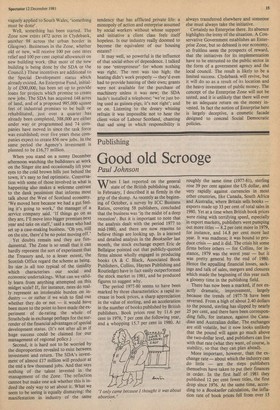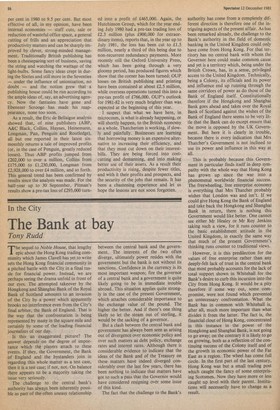Publishing
Good old Scrooge
Paul Johnson
When I last reported on the general state of the British publishing trade, in February, I described it as firmly in the grip of the slump. As recently as the beginning of October, a survey by ICC Business Ratios, covering 58 publishers, concluded that the business was 'in the midst of a deep recession'. But it is important to note that the analysis dealt with the period 1977 to mid-1980, and there are now reasons to believe things are looking up. In a learned and detailed analysis in the Bookseller last month, the stock exchange expert Eric de Bellaigue pointed out that publicly-quoted firms almost wholly engaged in producing books (A & C Black, Associated Book Publishers, Collins, Haynes Publishing and Routledge) have in fact easily outperformed the stock market in 1981, and he produced figures to suggest why.
The period 1977-80 seems to have been marked by three characteristics: a rapid increase in book prices, a sharp appreciation in the value of sterling, and an acceleration in the number of books published by British publishers. Book prices rose by 11.6 per cent in 1978, 7 per cent the following year, and a whopping 15.7 per cent in 1980. At roughly the same time (1977-81), sterling rose 39 per cent against the US dollar, and very rapidly against currencies in most other countries, like Canada, South Africa and Australia, where Britain sells books — exports made up 33 per cent of total sales in 1980. Yet at a time when British book prices were rising with terrifying speed, especially in export markets, publishers were pumping out more titles —.8.2 per cent more in 1979, for instance, and 14.8 per cent more last year. It was madness; it was bound to produce crisis — and it did. The crisis hit some firms before others — for Collins, for instance, 1979 was the worst year — but it was pretty general by the end of 1980. Hence the appalling financial losses, sackings and talk of sales, mergers and closures which made the beginning of this year such a gloomy time in the publishing field.
There has now been a marked, if not exactly dramatic, improvement, largely because the trends of 1977-78 have been reversed. From a high of about 2.40 dollars to the pound, sterling has slipped by nearly 25 per cent, and there have been corresponding falls, for instance, against the Canadian and Australian dollar. The exchanges are still volatile, but it now looks unlikely that the pound will again go much above the two-dollar level, and publishers can live with that rate (what they want, of course, is stability, so that they can plan ahead).
More important, however, than the exchange rate — about which the industry can do little — are the steps publishers themselves have taken to put their finances in order. In the first half of 1981 they published 12 per cent fewer titles, the first drop since 1976. At the same time, according to a Bookseller calculation, the inflation rate of book prices fell from over 15 per cent in 1980 to 9.5 per cent. But most effective of all, in my opinion, have been internal economies — staff cuts, sale or reduction of wasteful office space, a general cutting of frills and an appreciation that productivity matters and can be sharply improved by clever, strong-minded management. Traditionally British publishing has been a cheeseparing sort of business, saving the string and watching the wattage of the light-bulbs. Some fancy ideas crept in during the Sixties and still more in the Seventies — under the influence of unionisation, no doubt — and the notion grew that a publishing house could be run according to the ample ideas of, say, an advertising agency. Now the fantasies have gone and Ebenezer Scrooge has made his reappearance, none too soon.
As a result, the Eric de Bellaigue analysis showed that, of nine publishers (ABP, A&C Black, Collins, Haynes, Heinemann, Longman, Pan, Penguin and Routledge), all but one reported in their latest sixmonthly returns a tale of improved profits (or, in the case of Penguin, greatly reduced losses). Thus ABP profits jumped from £202,000 to over a million, Collins from £175,000 to £1,230,000, Longman from £2,928,000 to over £4 million, and so forth. This general trend has been confirmed by results since the analysis was made. For the half-year up to 30 September, Pitman's results show a pre-tax loss of £293,000 turn ed into a profit of £465,000. Again, the Hutchinson Group, which for the year ending July 1980 had a pre-tax trading loss of £2.3 million (plus £900,000 for extraordinary items), reports that, in the year up to July 1981, the loss has been cut to £1.5 million, nearly a third of this being due to non-recurrent redundancy payments. More recently still the Oxford University Press, which has been going through a very gloomy period, has produced figures which show that the corner has been turned: OUP losses on British publishing and printing have been contained at about £2.5 million, while overseas operations turned this into a pre-tax profit of £766,000. OUP's outlook for 1981-82 is very much brighter than was expected at the beginning of this year.
I suspect that what we have here, in microcosm, is what is already happening, or will shortly happen, to the British economy as a whole. Thatcherism is working, if slowly and painfully. Businesses are learning that borrowing money is an expensive alternative to increasing their efficiency, and that they must cut down on their interestbills. They are being forced into costcutting and demanning, and into making better use of their assets. As a result their productivity is rising, despite fewer titles, and with it their profits and prospects, and the security of the jobs that remain. It has been a chastening experience and let us hope the lessons are not soon forgotten.







































 Previous page
Previous page